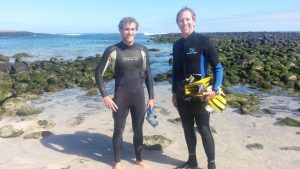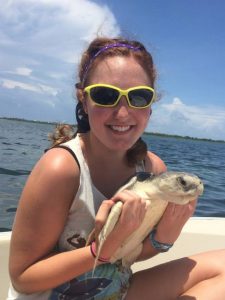Key Points:
- The UNC Biology Graduate Program is a doctoral (Ph.D.) program. The admissions committee will not accept students applying for a master’s (M.S.) degree.
- All graduate students interested in the Lohmann Lab must apply through the Biology Department admissions portal. Due to UNC bureaucracy, we are unable to consider applications that are sent through other departments or programs such as Marine Sciences, E3P, or BBSP. The deadline for applications is in early December each year.
- Space in the lab is very limited and fewer than ten percent of applicants can be accepted.
- Successful applicants typically have strong scientific training and a record of achievement that often includes considerable research experience, one or more published papers, and/or a master’s degree.
Information for Prospective Graduate Students: Graduate education is one of the central missions of our lab. At any given time the lab typically has 2-5 graduate students working toward a Ph.D. degree. These students are enrolled in the graduate program of the Department of Biology. We deliberately keep the lab group small so that we can provide promising graduate students with considerable one-on-one attention and assist each in developing an innovative and original research project. Considerable emphasis is placed on individualized training in the skills that provide the foundation for a successful scientific career; these include excellent writing, public speaking, research, and teaching skills. In addition, each graduate student in the lab is expected to establish — prior to completion of the Ph.D. — a strong record of published scientific work.
 People in the lab study diverse topics and animals and employ a variety of approaches ranging from experimental to theoretical. Research is conducted in a variety of settings ranging from laboratories at UNC to remote field sites in foreign countries. There is no expectation that everyone will work on the same model system or use the same approach; instead, the question that is being addressed often dictates the choice of organism and determines what methods will be most effective. Whenever possible, we favor interdisciplinary approaches that cut across traditional academic boundaries and rely on an eclectic combination of methods from disparate disciplines. Many of the most exciting projects in the lab have been conceived and initiated by graduate students. Students are encouraged to think creatively and to push into new areas, consistent with the availability of expertise and funding. Projects in the lab have relied on diverse techniques including confocal and electron microscopy, immunohistochemistry, transcriptomics, electrophysiology, behavioral studies in the lab, field studies in the ocean, observations by aerial drones, modeling of ocean currents, and analyses of geomagnetism. The lab is unified by a deep interest in the behavior, sensory ecology, and neuroethology of marine animals, a love of biodiversity, and a belief that integrative approaches are usually the most successful in unraveling complex biological mysteries. Within the lab group, broad interests, creativity, and good analytical skills are prized, as is a willingness to go where the path leads, even when this involves exploring unfamiliar fields.
People in the lab study diverse topics and animals and employ a variety of approaches ranging from experimental to theoretical. Research is conducted in a variety of settings ranging from laboratories at UNC to remote field sites in foreign countries. There is no expectation that everyone will work on the same model system or use the same approach; instead, the question that is being addressed often dictates the choice of organism and determines what methods will be most effective. Whenever possible, we favor interdisciplinary approaches that cut across traditional academic boundaries and rely on an eclectic combination of methods from disparate disciplines. Many of the most exciting projects in the lab have been conceived and initiated by graduate students. Students are encouraged to think creatively and to push into new areas, consistent with the availability of expertise and funding. Projects in the lab have relied on diverse techniques including confocal and electron microscopy, immunohistochemistry, transcriptomics, electrophysiology, behavioral studies in the lab, field studies in the ocean, observations by aerial drones, modeling of ocean currents, and analyses of geomagnetism. The lab is unified by a deep interest in the behavior, sensory ecology, and neuroethology of marine animals, a love of biodiversity, and a belief that integrative approaches are usually the most successful in unraveling complex biological mysteries. Within the lab group, broad interests, creativity, and good analytical skills are prized, as is a willingness to go where the path leads, even when this involves exploring unfamiliar fields.
 Financial Support: All students admitted to the UNC biology graduate program receive five years of guaranteed financial support from the university in the form of fellowships, research assistantships, or teaching assistantships. Students in the Lohmann Lab often receive additional supplemental financial support in the form of research assistantships paid for by the National Science Foundation, the Air Force Office of Scientific Research, the National Marine Fisheries Service, the Office of Naval Research, the UNC Center for Galapagos Studies, or another sponsor of the lab’s research.
Financial Support: All students admitted to the UNC biology graduate program receive five years of guaranteed financial support from the university in the form of fellowships, research assistantships, or teaching assistantships. Students in the Lohmann Lab often receive additional supplemental financial support in the form of research assistantships paid for by the National Science Foundation, the Air Force Office of Scientific Research, the National Marine Fisheries Service, the Office of Naval Research, the UNC Center for Galapagos Studies, or another sponsor of the lab’s research.
Applications: Applications for the biology graduate program are typically due at the start of December and the university does not permit late applications to be considered. During most years our lab receives inquiries and applications from approximately 15-25 prospective graduate students. Unfortunately, space in the lab is limited and we can usually only accept (at most) one new student per year. Admission to the lab is therefore highly competitive. Successful applicants are typically highly motivated, creative, and accomplished individuals who have a consuming interest in scientific research. Nearly all have: (1) a strong background in one or more fields of science or engineering; (2) a record of significant prior research experience and accomplishment, often including one or more published papers and/or a Master’s degree; (3) verbal and quantitative GRE scores above the 70th percentile; (4) a grade point average of at least 3.5 on a 4.0 scale; (5) the ability to work both independently and as a member of a team; and (6) broad interests in biology and the ambition to become an outstanding scientist. Because no single experience or achievement is an infallible predictor of scientific potential, however, we view these characteristics as general guidelines rather than rigid requirements. We welcome applications from students of any race, ethnicity, nationality, and sexual orientation.
 The biology graduate program at the University of North Carolina – Chapel Hill is a doctoral (Ph.D.) program and the admissions committee will not accept students seeking a Master’s (M.S.) degree. However, the M.S. degree is not a prerequisite for admission. Students with an undergraduate degree, outstanding credentials, and sufficient research experience can be admitted directly to the graduate program.
The biology graduate program at the University of North Carolina – Chapel Hill is a doctoral (Ph.D.) program and the admissions committee will not accept students seeking a Master’s (M.S.) degree. However, the M.S. degree is not a prerequisite for admission. Students with an undergraduate degree, outstanding credentials, and sufficient research experience can be admitted directly to the graduate program.
Prospective graduate students are encouraged to contact Dr. Ken Lohmann (KLohmann@email.unc.edu) and/or Dr. Catherine Lohmann (CLohmann@email.unc.edu) to indicate their interest in applying, to provide information about their background, and to indicate how they envision their research interests fitting into the lab.
About UNC: The University of North Carolina at Chapel Hill is the oldest public university in the United States, having first opened its doors in 1795. The institution is consistently ranked among the top five public universities in the nation. Chapel Hill is a vibrant college town known for its culture, music, academic events, and sports teams. It is located within the Research Triangle of North Carolina, a region defined by a cluster of three major universities (UNC, Duke, and North Carolina State University) and the Research Triangle Park, which is home to numerous computer, biotechnology, and pharmaceutical companies.
More information for prospective graduate students is available on the UNC Department of Biology home page.